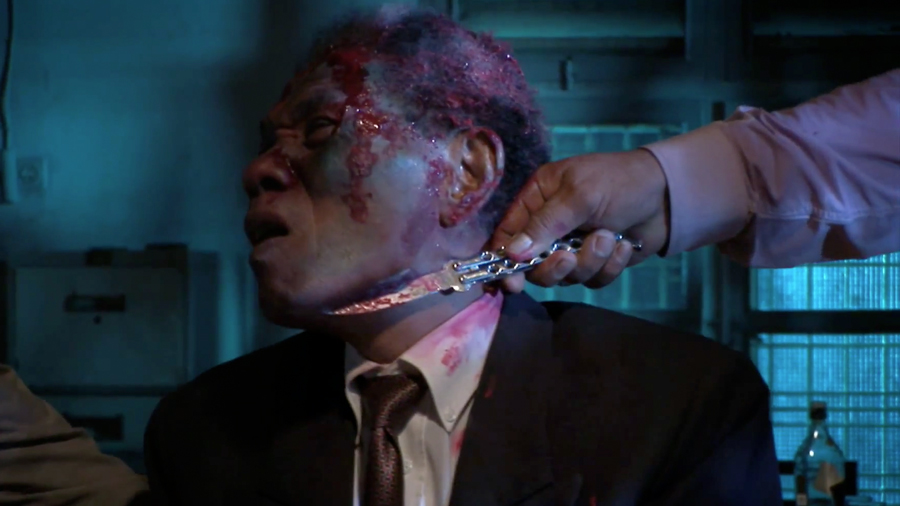Anwar Congo’s face is gaunt and when the septuagenarian smiles it crinkles impishly. On another Indonesian grandpa this would likely seem soothingly charismatic. But, when Congo discusses his history as a Communist-slaughtering warlord in the same tone as his love of Elvis movies, his smile can only seem sinister and wretched.
The Act of Killing is surely one of the strangest documentaries that screened at MIFF. And, quite possibly, one of the strangest things that has happened in cinema in quite some time.
Grandmaster of the documentary, Werner Herzog, described the film as “unprecedented in the history of cinema…” Which is a hefty claim from someone who boasts such an impressive personal filmic repertoire. Herzog signed on to the production as an executive producer alongside fellow legendary documentarian, Errol Morris. This is surely an indication of just how significant this film is.
Congo was an instrumental part of the 1965-66 Communist purge killings in Indonesia. He personally slayed at least 1000 people. Today, Congo lives as a free man and has never received punishment for his crimes; the killings are brushed aside in most Indonesian textbooks.
Instead of creating a straight-down-the-line historical overview of the tumultuous era (Ken Burns photo zooms, sombre narration, that sort of thing), director Joshua Oppenheimer opted for a slightly different approach.
When Oppenheimer and his production team trekked to Indonesia (from the U.K), they invited Congo and a few of his other of his fellow motley mass-murderers to create a fictional film interpreting their past crimes. The Act of Killing essentially becomes the making of that film.
Their created film is a lurid production. Make up is slapped to the actors’ faces like it would be at an 8-year-old’s sleepover. Congo’s portly friend Herman, who stares at him in hypnotic awe, appears inexplicably–but wonderfully–in drag in several scenes (‘The makeup artist and costume designer loved Divine,’ Oppenheimer told The Guardian). There are sweeping dream sequences of beautiful women slow-dancing in front of a waterfall.
Narratively, The Act of Killing is quite a challenging watch. Oppenheimer doesn’t offer much directorial intervention. A paragraph of text fades onto the screen at the very beginning, explaining briefly the 1960s conflict in Indonesia. Aside from this there is little in the way of structure provided to orient viewers. New characters wander unannounced onto screen. There is an inexplicable teeth-brushing scene that goes for what seems like at least three minutes. Maybe Oppenheimer figured any kind of directorial explanation would be somewhat impossible, so he didn’t even bother with it.
Somehow though, interest is sustained throughout the extended 159-minute runtime. This is mainly because the characters we meet are so morbidly fascinating. Congo favours candy-coloured 1940s pimp suits and unabashedly compares himself to Al Pacino. Then there’s the neo-paramilitary boss and his misogynistic golf course chat.
Seemingly, the aim of the bizarre filmic exercise is to induce some kind of remorse in Congo and his counterparts. Some of the men express guilt, at least to some extent, quite freely, but Congo is a harder nut to crack. At one point he explains to us his old favourite killing methods, then grins and segues into a cha-cha immediately after.
Towards the very end of the documentary, as he sits in his gaudy living room in front of a small TV, he watches the fictional film back. Congo appears in the scene, playing an interrogation victim (he fields multiple roles in the movie) being badly beaten in a dark room. Two of his young grandsons come and sit on his lap and he points out Grandpa ‘the movie star’ on the screen.
At this point, a flicker of remorse curses over him, something that he seems to have been trying so forcefully to suppress up until now.
Do we ultimately sympathise with the Grandpa warlord who used to throw Communists off bridges and harvest enemy blood? It’s hard to say. But what is definite is that The Act of Killing will leave you utterly fascinated and slightly unnerved by the absurd theatrics of the entire production.
